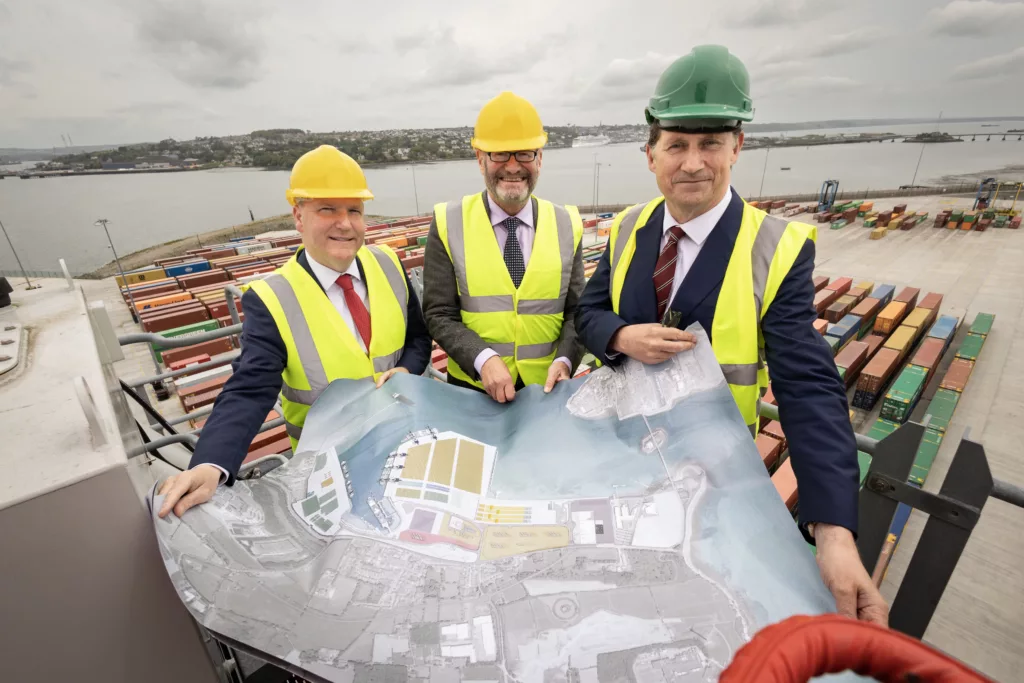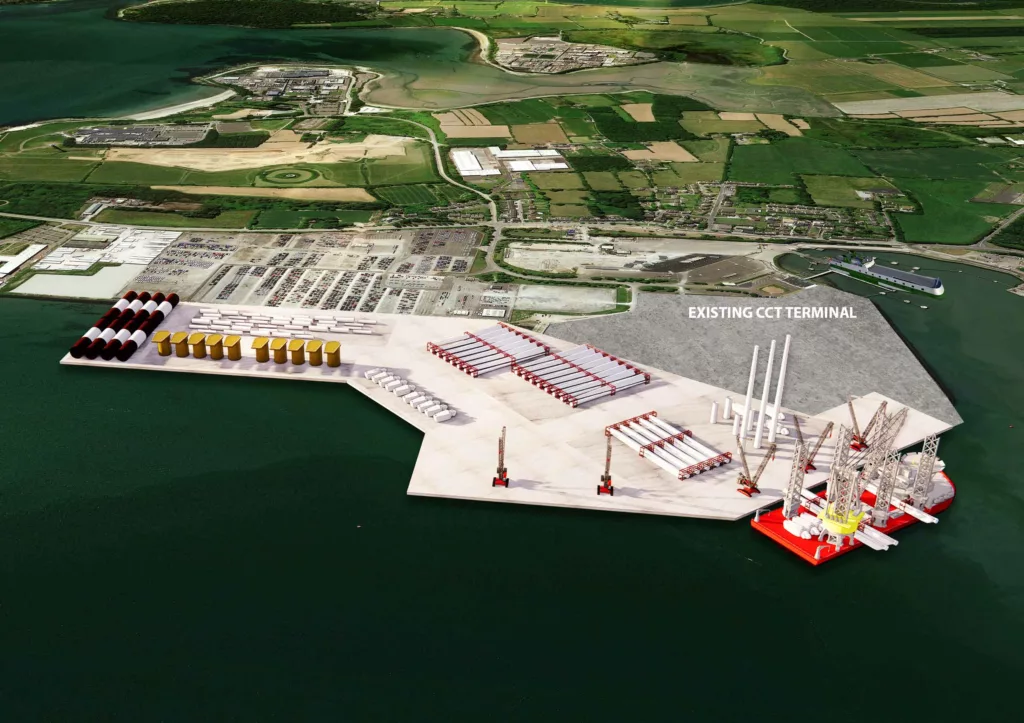20 May 2023
By Elaine Murphy
elaine@TheCork.ie

(Left/right) Minister for Finance Michael McGrath TD, Eoin McGettigan, Chief Executive Officer, Port of Cork Company, and Eamon Ryan T.D. Minister for Environment, Climate and Communications and Minister for Transport, pictured at Cork Container Terminal, at the launch of the ÒPort of Cork Masterplan 2050.
Supporting the accelerated growth of the fixed Offshore Renewable Energy (ORE) sector is a key component of the “Port of Cork Masterplan 2050” which was launched this week by Eamon Ryan T.D. Minister for Environment, Climate and Communications and Minister for Transport and Michael McGrath T.D. Minister for Finance at the Port of Cork, on Friday, 19th of May 2023.
The Port of Cork Company (PoCC) Masterplan outlines its plans and ambitions over the next three decades and provides an integrated framework for the port to strategically plan and adapt to meet the needs of Ireland’s future social, economic and environmental development. It includes plans to support the green energy sector and a roadmap outlining the Port’s ‘River to Sea’ journey, consolidating all activities in the lower harbour by 2050.
Eamon Ryan T.D., Minister for Environment, Climate and Communications and Minister for Transport, stated, “ I am delighted to be on-site… to be guided through the Masterplan and to see first-hand the world-class facilities that are already in place at the Port of Cork.
Cork Harbour is one of the largest natural harbours in the world. It has been a working port for centuries and is one of Ireland’s major employment hubs. The Port of Cork Masterplan offers a strategic blueprint towards the future, with the facilitation of fixed Offshore Renewable Energy as a central part of the plan, with full planning permission already in place to provide essential onshore infrastructure resources. I also welcome the port’s ambitions to achieve a 51% reduction in overall greenhouse gas emissions by 2030, reaching NetZero emissions by 2050, in accordance with the government’s Climate Action Plan 2023. This new plan is definitely charting a course to a new sustainable and secure future for the Port.”
Eoin McGettigan, Chief Executive Officer at the Port of Cork Company stated, “Historically, the Port of Cork has been an energy hub for the region by facilitating the import of fuels such as coal, oil, timber, and land-based wind turbines. As we make the necessary move away from fossil fuel consumption, the Port of Cork will continue to play a key role in facilitating the future energy needs of the country as a hub for renewable fuels, transition fuels and offshore energy streams.
McGettigan continued, “The Port of Cork is a commercial port and to ensure its ongoing competitiveness, we must adapt to the rapidly changing customer expectations which are pressuring the shipping industry to deliver goods in a faster, more flexible, and sustainable manner at low delivery cost. To do this, we must provide our customers with reliable, safe, high-performing facilities and services, and be an efficient link in the logistics chain. Despite this commercial ambition, we are extremely aware of our heritage and the role we play in our local community. As we endeavour to meet changing demands, the well-being of the people of Cork and its environment will continue to be embedded in our values, and be reflected in every decision we make.”
To find out more about the Port of Cork and to read the ‘Port of Cork Masterplan 2050’ Executive Summary, please visit www.portofcork.ie/port-of-cork-masterplan-2050/.
About Port of Cork Company
The Port of Cork is the world’s second-largest natural harbour and a key international trade gateway. It is the key seaport in the south of Ireland and is one of the three Ports of National Significance (Tier 1) as designated by National Ports Policy.
The National Ports Policy mandates Tier 1 Ports to lead the response in meeting Ireland’s future port capacity requirements. In this capacity, the port is also central to the national economic growth given that national ports handle approximately 90% of all imported and exported tonnage in Ireland.
The Port of Cork Company (PoCC) is a commercial semi-state company responsible for the broad range of commercial running of Cork harbour as well as the navigation and berthage in the port.
As a multi-model port it is only one of two ports in Ireland to service all six shipping modes – lift on/ lift off, roll-on/ roll-off, liquid bulk, dry bulk, break bulk and cruise.
In 2021, the Ports of Cork and Bantry reported a total consolidated traffic throughput of 10.6 million tonnes in line with 2020. The PoCC’s direct workforce is 150 staff, however, it supports thousands of jobs through indirect employment through warehouses, hauliers and shipping agents.
PoCC is a hugely important catalyst for trade and employment, offering direct connectivity to a global supply chain, particularly for FDI. 35 of its top customers are from industries such as Med-Tec, Pharma, IT, chemical and Agri-Food accounting for €145 billion of manufacturing and supporting over 45,000 jobs directly in the southwest region.
The Port of Cork Company’s facilities and operations are situated at four distinct locations in Cork’s natural deep water harbour: The City Quays provide the service for bulks, both Tivoli and Cork Container Terminal (CCT) Ringaskiddy provide the lift on/ lift off, roll-on/ roll-off and bulks services, while Cobh caters for cruise liners with Ireland’s only dedicated deep-water berth for cruise ships.


